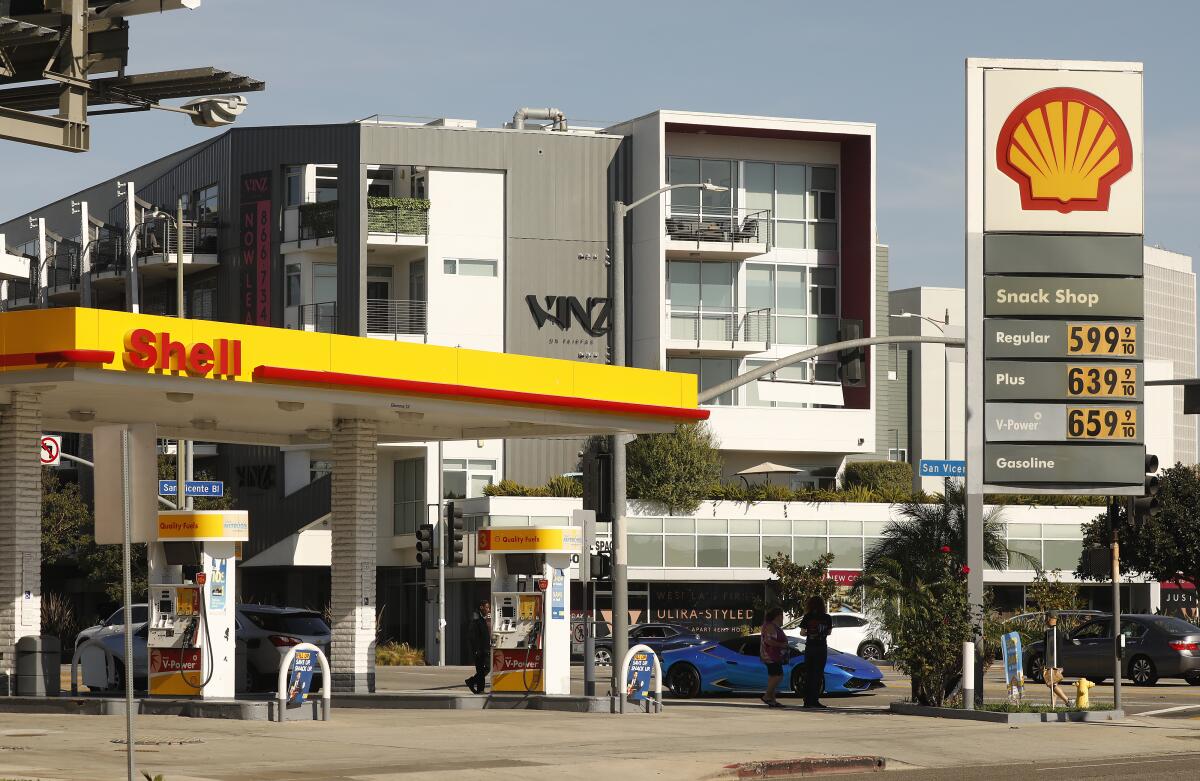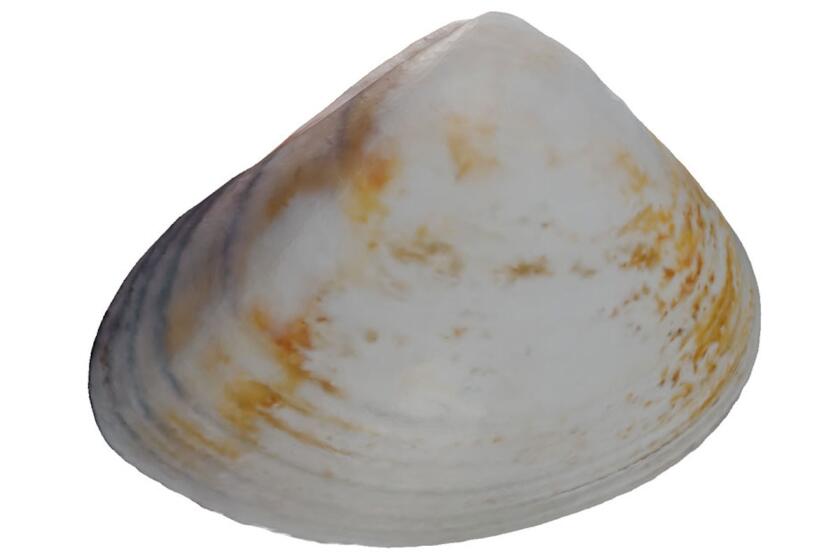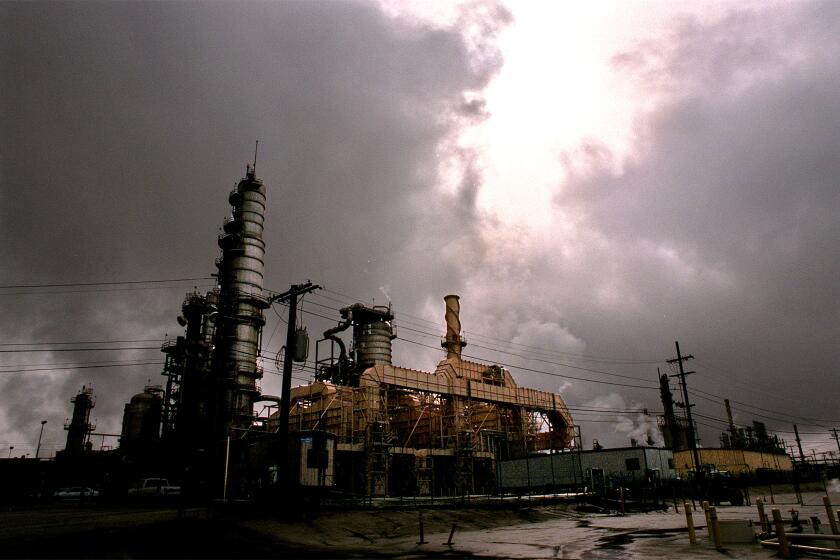Op-Ed: Will Shell’s oil future outlast its ocean namesakes?

- Share via
When Royal Dutch Shell’s new chairman, Andrew Mackenzie, asks shareholders on Friday for their vote to move the global oil giant’s headquarters from the Netherlands to Britain and drop the “Royal Dutch,” he will also be asking to return the company home.
In a history better suited to fairy tales than the financial pages, Shell rose from a small seashell shop in the East End of London. In the 1830s, a Jewish curio seller named Marcus Samuel began importing tropical seashells from the Far East. His shop sold “small Shells for Ladies’ work,” along with large, shining specimens such as conchs and nautiluses for still-life drawing.
Samuel’s idea to manufacture shell-bejeweled boxes for sale in seaside resorts made the family’s first fortune. He mass-produced the souvenirs and sold them to shops with the tags “A Gift from Brighton,” “A Gift from Margate” and so on. Similar shell boxes are ubiquitous in today’s beach shops from the U.K.’s Brighton to the U.S.’ Outer Banks.
In the next generation, Samuel’s sons, still surrounded by seashells in the curio shop, began transporting kerosene to their father’s old trading partners in the East. In 1892, they beat John D. Rockefeller and Standard Oil to build the first tanker that could carry bulk oil through the Suez Canal. They named their new transportation company Shell in honor of their father. They christened that first tanker the Murex — for a marine mollusk that builds an ornate, spiked shell.
After the Murex successfully hauled 4,000 tons of Russian kerosene through the Suez Canal that fall, the company launched 10 other tankers. All were named for seashells: the Conch, Clam, Elax, Bullmouth, Volute, Turbo, Trocas, Spondilus, Nerite and Cowrie. The tradition endured after Shell’s merger with Royal Dutch Petroleum in 1907. Today, Royal Dutch Shell is on its fifth Murex, a 100,000-ton tanker that hauls liquified natural gas across the global seas.
The live murex has not proliferated similarly. Earlier this year, scientists who study marine mollusks — the shy, squishy animals that build the sea’s extraordinary shells — discovered the world’s worst climate-driven loss of marine life to date in the Mediterranean Sea. Along the coast of Israel, not far from where Shell’s first SS Murex entered the Suez Canal in 1892, researchers found mollusk populations in the soft shallows have collapsed by nearly 90% in recent decades, unable to tolerate ocean warming caused by the fossil fuels carried in those holds.
This week Congress can expose the deceptions of Big Oil as it did for Big Tobacco nearly three decades ago.
Lead researcher Paolo G. Albano, senior scientist at Italy’s Anton Dohrn Zoological Station, uses empty shells to understand changes in species distribution over time. The heat, he says, has been “disastrous” for native mollusks. He found that especially true for one genus: murex. The animals for which Shell’s first tanker was named were so abundant historically that they survived centuries of harvest by the Phoenicians, who crushed them for the famed purple dye used in royal garments. The region’s murex remained common until a few decades ago, Albano says. But they could not survive the ocean temperatures off the Israeli coast, which have risen 3 degrees Celsius in three decades.
What concerns Albano most is to see such common animals dying long before the world reaches the 1.5-degree Celsius planetary limit commonly cited as the goal to avert catastrophic warming. “What we are seeing hasn’t happened with 1.5 degrees,” Albano told me. “It has happened with a lot less.”
Shell’s oil and gas tankers are not large enough to hold the irony. In announcing the company’s streamlining, Mackenzie stressed the need to “speed up Shell’s transition to a net-zero emissions energy business.” Moving its headquarters from The Hague to London will also allow Shell to avoid Dutch taxes — which run higher than Britain’s — and tensions building with Dutch authorities and activists over climate change. In May, a Dutch court ruled in a landmark case that the company must deepen greenhouse gas emissions cuts to align with the 1.5-degree goal. (Shell reports it must follow that ruling regardless of its tax residence.) This fall, ABP, the Netherlands’ largest state pension fund, purged Shell and other fossil fuel companies from its portfolio.
The restructuring may help Murex ships continue to sail into the future. There is no such assurance for the living murexes, or all the other life that depends on the seas.
Cynthia Barnett is the author, most recently, of “The Sound of the Sea: Seashells and the Fate of the Oceans.” She is environmental journalist in residence at the University of Florida’s College of Journalism and Communications.
More to Read
A cure for the common opinion
Get thought-provoking perspectives with our weekly newsletter.
You may occasionally receive promotional content from the Los Angeles Times.












